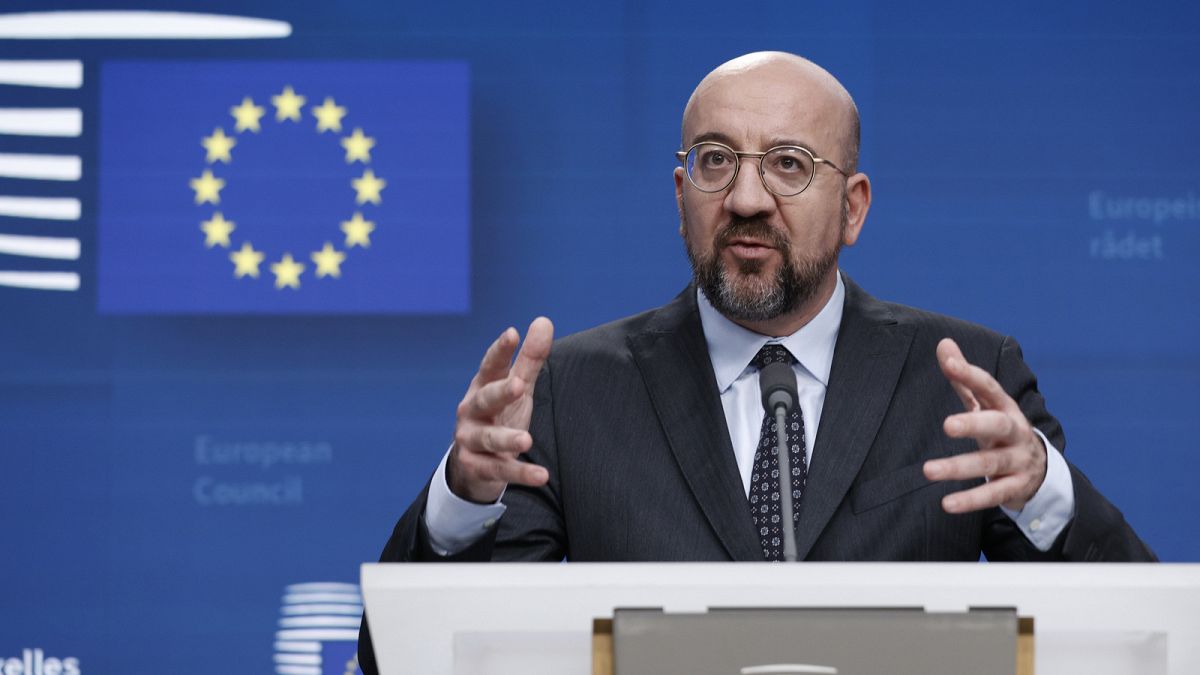European Union countries willing to recognise the State of Palestine should move in tandem in order to “trigger significant progress” in building peace in the war-torn region, European Council President Charles Michel has said.
Speaking to journalists in Brussels this week, Michel floated “coordination at EU level” among those member states ready to formally recognise a Palestinian sovereign state, a move that has gained traction since the endorsement of Spain, Ireland, Slovenia and Malta last month.
Michel, who is tasked with forging consensus among all 27 EU leaders, suggested other like-minded countries outside the bloc could also join the initiative.
While nine EU member states already formally recognise the Palestinians’ right to statehood – including the likes of Bulgaria, the Czech Republic, Romania and Sweden – the EU’s official position is that it will recognise a Palestinian state once it is established as part of a two-state solution, the internationally-endorsed peace proposal for the region.
But coordinated recognition from member countries could provide the bloc with more “leverage” to urge both Israel and the Palestinian Authority to conduct the reforms needed to make a two-state solution possible, according to Michel.
Whilst he refrained from detailing what such reforms could entail, Michel suggested the European Union should use the “tools” at its disposal, such as the EU-Israel Association Agreement, to ensure Israel complies with the rule of law and with international humanitarian law.
The Association Agreement establishes the trade and institutional ties between the EU and Israel, and includes an article that imposes binding obligations on both parties to uphold human rights. Ireland and Spain’s call to review the agreement in light of Israel’s violations of fundamental rights in Gaza has failed to garner the necessary unanimous backing of all 27 member states.
“This Association Agreement takes into account the respect of the rule of law (and) of international law, including international humanitarian law,” Michel explained.
“The Commission has a responsibility to assess if this is respected or not. If it is not respected, the Commission can make a proposal related to this association agreement,” Michel said, in a clear signal of support for a review of the agreement.
On Tuesday, the UN’s special rapporteur on Palestine, Francesca Albanese, told Euronews that the bloc must halt trade ties with Israel to deter war crimes that amount to genocide in the besieged Gaza Strip.
It comes as international pressure also mounts on the US and Germany to suspend sales of arms used by Israel to power its offensive in Gaza.
Spain leads push for recognition of Palestinian State
Michel’s call for a coordinated recognition of the State of Palestine comes following a joint endorsement of the move by the leaders of Spain, Ireland, Slovenia and Malta following a summit of EU leaders last month.
The prospect has since gained traction, with Belgian ministers confirming they also stand ready to support the recognition of a Palestinian State comprising the West Bank, the Gaza Strip and East Jerusalem.
A spokesperson on behalf of the Spanish government said Tuesday that Prime Minister Pedro Sánchez will meet the leaders of Norway, Ireland, Portugal, Slovenia and Belgium to discuss the situation in Gaza and the recognition of the State of Palestine, before all 27 EU leaders convene in Brussels next Wednesday.
Sánchez, who has spearheaded efforts to toughen the EU’s stance on Israel, has indicated Spain will move to recognise the State of Palestine by July.
But several member states eager to uphold a strong stance of solidarity with Israel are likely to refrain from backing the move, further entrenching the deeply divided stance of EU capitals on the conflict in the Middle East.
The EU hopes to play a central role in future negotiations between Israel and Palestine, weighing in with a roadmap and principles for a potential peace process.
But its inability to swiftly forge unanimous positions on a raft of issues, including calls for a ceasefire, has dented its credibility.
Michel acknowledged that the joint EU call for a ceasefire “took too much time,” but expressed confidence that there will be a “moment” when the conditions will be right for a coordination between member states to formally recognise Palestinian statehood.

